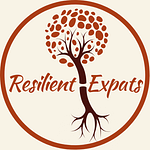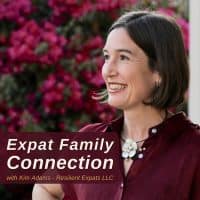LISTEN on your favorite podcast player:
About this episode
Most of us working overseas do NOT have a robust support program in place for the entire family, to ensure we’ve got the skills needed to cope well with being inserted into a different culture plus being highly mobile. This is something I want to change. Together, we’ll raise a healthier generation of TCKs.
About this podcast
Living an international life and raising kids abroad is amazing … and it can get intense!
Being so far away from loved ones, the constant rounds of goodbyes, piecing together a cohesive education at multiple international schools, the eventual transition to university with its own brand of culture shock … and that’s only a few of the factors adding complexity for globally mobile families.
I’m on a mission to raise a healthier generation of Third Culture Kids (TCKs) – and the parents who raise them.
That means making sure you know the pitfalls to avoid, and giving you practical measures that really help. I’ll draw on my experience raising 3 TCKs, reading and research, experiences of friends and colleagues, including many international school teachers, counselors, seasoned coaches, artists and others doing fantastic work to ease the lives of expats around the globe.
I believe we’re stronger together. Join me for a heart to heart, full of warmth and compassion… for you and for me… because honestly I’m figuring it out as I go along, just like most parents!
For more, come hang out with me on Facebook; hearing from you would make my day!
RESOURCES mentioned in this episode:
The 7 Ss of successful expat family transition, in article: Move Your Family Overseas Successfully When You Remember These Points
RATHER READ? I’ve got you covered.
I am the proud mother of three Third Culture Kids.
I read about this. I thought that I knew – pretty much – what it was all about.
But I was wrong.
I knew what it was to be an adult, to go from a solidly grounded place in my American culture, into a new culture, and how that challenged my sense of self and caused me to re-examine aspects of myself.
But I really did NOT get it.
Not until the day my daughter came to me with an assignment from school. She was supposed to do some research on her “home country.” And she admitted that she didn’t know which country to choose. She told me, “I don’t really feel like I’m an American. So I chose Oman. Can you help me?”
This really threw me! My daughter’s not an American?! How is that possible?!
I felt like I had failed to pass on the “right” identity. Even though I knew this was coming, there’s a huge difference between reading about it and experiencing it first hand.
Or I suppose it’s still second hand, because it’s my daughter who’s developing her sense of identity while I watch, feeling a little bit helpless at times.
If the term “Third Culture Kid” is new to you, that’s a child being raised outside their parents’ passport country. You can think of the parents’ culture as the First Culture, the host country as the Second Culture, and the space the child occupies, that is somewhat a mix of those two cultures, but is more of a space in between, as the Third Culture.
TCKs often feel more affinity or similarity to other TCKs than to any other culture, even if they grew up in wildly different parts of the world.
There are many advantages and benefits to kids who are raised in this unique environment. And … there’s a flip side of the coin. Because TCKs can face a few struggles that take years, or a lifetime, to work through.
This is pretty well documented, and there’s more material available all the time. But a lot of the material is pretty dense, like textbook reading. And it’s not common knowledge, unfortunately.
Some Third Culture Kids are suffering. I see this in stories they share with each other. Some of it is just stuff people have to work through, and it helps to bounce off others with similar experiences. But some of it could have been SO much better if their parents had known better how to help their kids through the difficult parts.
That’s why I’m here.
Do you know the name Dr. Spock? He wrote a book on babies and child care that was THE reference manual for several generations of parents. Back in the days before Dr. Google? Before you could say, “Hey Siri, …” anytime you had a question?
Kind of like Dr. Spock was for babies, this podcast – and my website, articles, workshops, and 1-1 work – is designed for parents raising their kids outside their passport country. For parents hoping to be aware and conscious, to minimize the drawbacks and do the best job possible helping their kids through, so they’re thriving into adulthood.
I am on a mission to raise a healthier generation of Third Culture Kids. I want the special issues TCKs face, and the tools for helping, to be common knowledge and commonly used.
Some people will happily delve into the books, and read loads of articles, and seek out information on loss and grief and other heavy topics. Which is great…
But I know people are busy and would rather have some condensed highlights.
Just give me the stuff that’ll make it easier. I don’t need the theory, I just need the practical what to do. So my aim is to provide that.
I want to educate and remind about the particular needs of globally mobile families, and not just the parents, but the whole family as a unit.
Some of the topics I’ll cover, I could summarize by what I named the 7 Ss of successful expat family transition: these are seven areas that need attention:
- Set the stage – which is about knowing what to expect, doing your homework, on the emotional side as well as all the things you think of when you’re getting ready for an international move
- Say it, Susie! – which is about open communication with your family members – and yourself!
- Sadness and Sorrow – which is about learning how to say goodbye and addressing loss and grief
- Social Stability – that’s about strong relationships and connections, both in your previous place and your local community
Number 1. was Set the stage; 2. Say it Susie!; 3. Sadness and Sorrow; 4. Social Stability. Now: - Schools Savvy – this is about knowing how to advocate for your child and understanding and accepting the trade offs of an international school education
- Security and Safety – is about taking the edge off your anxiety because you know in advance who you’re going to contact when you need various kinds of help
- Stress Strategies – your coping skills and knowing yourself and what helps you relax and rejuvenate, and building it in
You can find these 7 topics summarized in my blog post at Resilient Expats dot com / move your family overseas successfully when you remember these points (with dashes between the words) – sorry that’s a mouthful! I’ll put a link in the shownotes.
To get into these topics, I’m planning to talk with people like:
- international school teachers and counselors,
- those who help students make the transition to university,
- family therapists,
- those who use use and teach how to use art for therapeutic and stress relieving purposes,
- I’ll bring on parents,
- I want to highlight members from my community so we can all get to know each other on a deeper level,
- I’ll invite my clients to share their experiences.
I’m also interested in finding people who can talk with us about topics around the effects of colonialism, and passport privilege (something I’ve become very aware of the past few years) and all the ways racism is alive everywhere, in the very diverse cultural contexts we find ourselves in… and how we can become agents of change in that, even when we don’t speak the local language or may not understand the local government systems.
I’m also interested in topics around peace making and reconciliation. I get frustrated with the way discourse seems to happen in my home country – in the US, where there’s a lot of heated exchange going on. There seems to be more interest in soundbites and getting the last word and delivering a zinger or being clever. In that sort of “conversational” environment, how can I express how I’ve been changed by living overseas? How can I share in a meaningful way, the richness of engaging with others who are different than me?
My frame of reference is international school teaching families. Since my husband is a teacher, our life revolves completely around the school year, and the cycles of new teachers arriving, becoming friends and then leaving after a few years to experience another country… which is very exciting AND very stressful.
For teaching families, there’s often not a strong integration into the local culture because you spend all day, every day, speaking English and teaching English and relating to English speakers, which creates a bit of a bubble.
With all this coming & going, the population is very transient, and life in general doesn’t have the same sense of stability than what I had growing up in one place much of my childhood.
No matter what kind of expat you are … whether you’re in a cross-cultural marriage, or an immigrant; whether you’re in a stable corporate job, or have struck out into the unknown for a great adventure without knowing exactly how you’ll support yourself; whether you’re a first time expat, or a love-pat, or a re-pat, … we share a lot of common experiences.
And the sad truth is, MOST of us work for an organization that does not have a robust support program for the entire family, … to check in regularly, to ensure you all have the emotional skills needed to cope with particular needs of a family that’s been sort plunked down in the midst of a different culture (whether it was your choice or not, it does come with stress). This is something I want to change.
So stick around, and we’ll learn together. Together, we’ll raise a healthier generation of TCKs.
I am honored that you’ve spent some of your time with me today.
I would love to hear what topics YOU are interested in. You can find me on Facebook / groups / Resilient Expats. Or send me an email at kim @ resilient expats . com.
Go ahead and listen to the interviews I’ve got ready for you … the first 4 episodes I recorded back in March just as things were shutting down here locally with the pandemic, and in July finally got them edited.
We recorded online, so there are occasional little glitches, which I’m guessing you are very used to with talking to your family. The first interview was recorded in a school building while school was in session, so there are a few times where there’s a little background noise. I don’t think these little sound quality issues are going to bother you but I just wanted to mention them.
Please do share this podcast widely! Probably every podcast you listen to asks you to rate and review, and yes, it does make a difference in letting other people find it, so yes, please do rate and review and share.
I’m so excited to get this launched.
Have a wonderful day!
Enjoyed this episode?
Take a screenshot and share it with your friends … tag @ResilientExpats.







